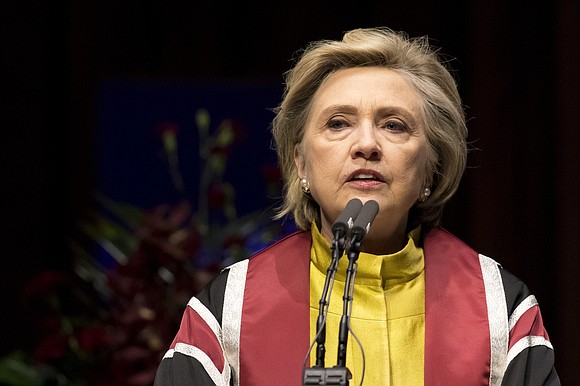Amy Klobuchar's not-so-subtle troll of Hillary Clinton
CNN/Stylemagazine.com Newswire | 2/11/2019, 1:13 p.m.
Analysis by Chris Cillizza, CNN Editor-at-large
(CNN) -- On Sunday, after announcing for president, Minnesota Sen. Amy Klobuchar took questions from reporters about her 2020 plans. She was asked about her travel plans for the early days of the campaign, and said this:
"We're going to be in Iowa and Wisconsin. We're starting in Wisconsin because, as you remember, there wasn't a lot of campaigning in Wisconsin in 2016. With me, that changes. ... I'm going to be there a lot."
Heyooooooo!
If you don't get the reference, it's to this: Hillary Clinton lost Wisconsin to Donald Trump in 2016, the first Democrat to lose the Badger State since 1984. Clinton believed the state was in the bag, and didn't campaign there during the general election race. Not once.
As Clinton explained in her campaign memoir "What Happened":
"If there's one place where we were caught by surprise, it was Wisconsin. Polls showed us comfortably ahead, right up until the end. They also looked good for the Democrat running for Senate, Russ Feingold. We had 133 staff on the ground and spent nearly $3 million on TV, but if our data (or anyone else's) had shown we were in danger, of course we would have invested even more," she writes. "I would have torn up my schedule, which was designed based on the best information we had, and camped out there."
The failure to visit Wisconsin became, for many Democrats, symbolic of the fatal flaw of Clinton's campaign: She simply took the industrial Midwest for granted -- and watched as Trump won Wisconsin, Michigan, Ohio and Pennsylvania, and with those states, the White House.
While a few voices have emerged since Clinton's stunning loss questioning her campaign's strategy in the Midwest, most Democratic politicians -- particularly those with an eye on being the party's 2020 presidential nominee -- have avoided directly criticizing the way the former secretary of state ran her campaign. That reticence is usually explained in two ways: 1) Talking about what Democrats did wrong in the past isn't any way to solve beating Donald Trump in the future and 2) Clinton -- and her husband -- remain major figures within the Democratic Party, and crossing them isn't a very good idea.
Which is what makes Klobuchar's purposeful calling out of Clinton and the campaign she ran all the more intriguing.
In case you think -- and I know there are some of you out there! -- that Klobuchar didn't really mean to send a signal that she was a clear break from the Clinton way of doing things, consider that Wisconsin's presidential primary is currently set for April 7, 2020. That's more than two months after the first votes are expected to be cast in Iowa. So, there's no real reason to go there this early, except as a symbolic way to demonstrate that Klobuchar won't take the Midwest for granted -- as she is clearly implying Clinton did.
In truth, the Clinton swipe may be a sort of necessary byproduct of the broader Klobuchar pitch to distinguish herself from the rest of the growing 2020 field: I may not be the best-known or best-funded candidate, but I know how to win in the place that the best-known and best-funded candidate couldn't the last time around.
Klobuchar announced on the Mississippi River in the middle of a Midwestern snowstorm to drive that point home. Just in case you missed the overt symbolism of the backdrop, Klobuchar drove it home in the speech itself. "On an island in the middle of the mighty Mississippi, in our nation's heartland, at a time when we must heal the heart of our democracy and renew our commitment to the common good, I stand before you as the granddaughter of an iron ore miner, the daughter of a teacher and a newspaperman, the first woman elected to the United States Senate from the state of Minnesota, to announce my candidacy for president of the United States," she said.
All campaigns are fought amid the specter of the last race, particularly when that last race was a losing one. What Klobuchar did is acknowledge the specter in the room, made clear that she believes Clinton made a very big mistake and pledged not to repeat that error.
It's a clear strategy. But is it one that pays off?




